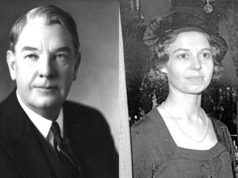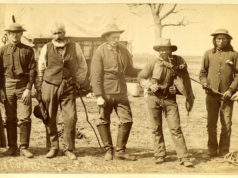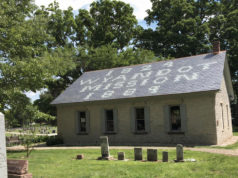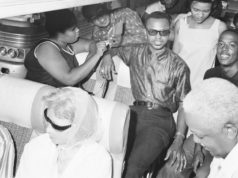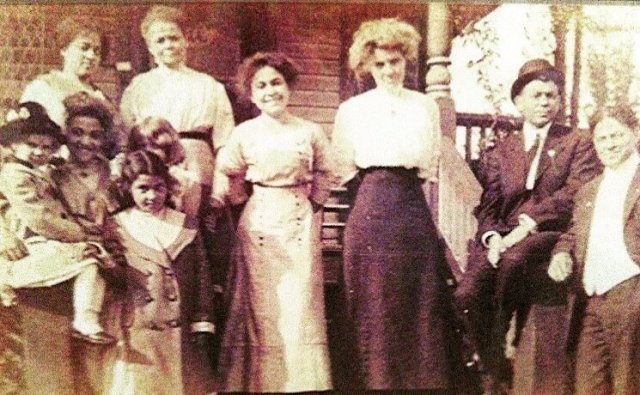

(Editor’s note: The following is an excerpt from the novel Ghosts of Ursino, which was inspired by the author’s great-great-grandparents’ interracial marriage. The author will be signing copies at Full Circle Bookstore on Saturday, April 20, at 3 p.m. This excerpt, from chapter 17, has been lightly edited for length and style.)
* * *
Eve
1957, Oak Lawn, Illinois
Eve is only eight, and at eight, she is only tall enough to peer and rummage through the middle shelves of the Menards goods store on Pulaski Road. Her father, Edward, likes to occasionally bring her along on his sales calls. As a local supplier, and this being one of his oldest accounts, he insists on being present and often. Bringing Eve tends to brighten up the folks there. She knew how to charm people. Her impish smile, her youthful curiosity. It’s what they like.
As was the custom, Eve could select a treat from the candy section. Half a dozen per visit.
“Daddy, should I get some orange jellies for Rita?” Eve popped her head around the shelving, toward Edward at the front of the store. He smiles and nods yes.
His daughter’s uninhibited glee over the simple joy of childhood. It soothes him in a way he would struggle to explain. Edward also loves to elucidate her on the process of how a particular caramel came into being, and stocked on the shelf of a store like this one. It was a way for her to get a glimpse of his day-to-day work, he thought.
Eve typically chose her prize by color. Today she arranged her lime-green taffies and lemon drops across the skirt of her light blue dress as she knelt down. Each squarely placed across, like characters in her play world. A family of confection in her budding imagination.
Townsfolk were flowing in and out the front entrance, the jingle of the door chime marking the brisk activity. Edward knew many of the customers. They weren’t friends — he had few of those. These were public acquaintances he knew only from appearance and their standing in his world. Some small talk was required. About the weather, about the increasingly crowded sidewalks, opinions about President Eisenhower. Edward excelled at this ritual. It was safe.
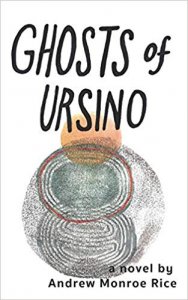
A colored man was among the customers this morning, taking his time collecting hardware items. He stood out to Eve, because of the way the energy in the store shifted, like cans falling off a shelf, and then all the sounds muted. There were not many blacks in Oak Lawn. Several of the men in the store stopped everything to watch him, like he was fresh off the train from the Far East or was dressed in a pink gown.
A white man of about 60, with a painter’s hat, wire-rim spectacles and overalls, looked disapprovingly. Of this, Eve was keenly sensitive. He was exaggerated in his monitoring. He wanted the negro to see that he was being watched. Eve was puzzled by the tension. She presumed the negro man must have done something malicious to these men.
The negro man was dressed neatly, even if in laborer’s clothes. His faded khaki coveralls fit loosely around his chest and thighs, not revealing his slim stature. He kept his gaze toward the floor, unassuming, avoiding eye contact with the others. Eve kept watch of him, hoping he would look her way. She wanted to talk to him. She thought about introducing him to her father, who was up by the front counter.
She didn’t know why.
Edward was chatting with Mr. Sanderson, the manager. They were both looking over the accounts ledger. This was Edward’s comfort zone, being polite and reasonable. He often wondered, while smoking on his porch, how else he could deploy it to good use. An acquaintance would go on about baseball and the Cubs and their woes, Edward would nod and say “it’s a shame.” But he never had the game on the radio, found sports to be tedious. He preferred blues music, or opera, and smoking, his long sips of bourbon. Edward loved books about as much as he loved bourbon. He could lose his entire Saturday, apart from his girls, absorbed in Faulkner’s As I Lay Dying.
Mr. Sanderson held up a jar of molasses and, seeming to identify some defect Edward should know about, motioned to a case of them. Her father duly noted. Agreeable and fair. Eve was too far off to hear the details of their words. Sounds of a radio were drifting from behind the counter. Elvis Presley.
Well, my hands are shaky and my knees are weak.
I can’t seem to stand on my own two feet
Eve still sat on her shins, the blue of her dress perfectly strewn across the dusty hardwood. Her bounty was arranged in a half moon across her skirt still. Eve knew some drama was unfolding around her. She kept glancing back toward her father, and at the colored man. She so wanted for this man and her father to talk. At the very least, to acknowledge each other.
Eve saw that her father was noticeably ignoring the tension swirling around the store. He acted like he didn’t see the stern side glances or hear the cacophony of cleared throats. This made Edward stand out even more to his daughter.
The colored man waited patiently for Edward and Mr. Sanderson to complete their work. Edward made a gesture to the negro man, pausing his trading, and invited the man forward to pay. Mr. Sanderson became displeased, short-tempered even, an involuntary, scolding grimace toward Edward.
Mr. Sanderson was not looking directly at the colored man, but, with irritation, he called back to the shop hand, to have him come settle up the negro man’s purchase.
Eve was summoned by Edward to the front counter, to settle her candy haul with the clerk and to be doted on. The colored man exited briskly, and didn’t comment on her haul of candy like a few of the other men around her did. Eve stopped and watched the negro man through the store’s front window. He looked back at Eve as he walked down the sidewalk. Eve noticed his eyes had no emotion whatsoever.
This man must have done something wrong, she thought.
“I tell ya, coloreds now moving in south of Bretton street. That one sure was gonna flout what he knows is pushing it,” said the bespeckled, red-nosed man, spitting the words as much as anything. He was gesticulating toward the door.
Eve wondered what “flout” meant.
Mr. Sanderson said, “negroes ruining a great city like Chicago even. Never imagined they would make their way out here.” He paused and looked down to gather Edward’s change for him. “This community has a temperate history, Mr. Steisch, going back many years.” Edward wondered in that moment why Mr. Sanderson presumed he wasn’t a local, why he needed a lesson in Oak Lawn’s valiant past.
Edward, in that suspended space between Sanderson’s last word and his exhale, he was charged up, he so wanted to belittle his trading partner. He could taste the acid in his throat. He knew he could easily embarrass this charlatan. But with Edward, that was not his nature. This was his private misfortune, sometimes exposed publicly in a naked form of which he was unaware.
Edward nodded politely, agreeably, but it was insubstantial. His eyes took on their own will and were trying to provoke. His pupils were vibrating.
Eve watched her daddy start to rush the clerk now, to speed up the checkout. Withdrawing, his easy charm was now slowly coming undone.
I’m proud to say that she’s my buttercup
I’m in love
I’m all shook up
He grasped her hand tightly, to exit the store and lead her home. He forced himself to tip his hat toward Sanderson as they exited the storefront. His hand was sweaty. He squeezed Eve’s too tight. It hurt. He walked her hurriedly.
An unwanted memory invaded him now, like a stranger who knocks late at night. The time he first swam with his father, Edgar, many years before. The unspoken animosities, the sense you were part of something unwanted, that you were a problem.
After some time, Eve asked, “did that negro man do something wrong, Daddy?”
Edward didn’t avert his eyes from straight ahead on the busy sidewalk, patrons in and out of storefronts busy at lunch time.
“No, Eve,” he replied after some time. She felt he was treating her like the child she appeared to be, but not the child who was actually caught up in something sober, real.
He didn’t say another word to her on their walk home. Once there, he sat alone on the porch and smoked three cigarettes one after the other after the other. That was not normal for her daddy. She knew these things.
Eve’s daddy kept his hat on, pulled low.
Didn’t he have more work to do?
He had always removed his hat upon entering their home. Eve went to her mother and displayed her sweet bounty. She tossed Rita her jellies and half of them spilled on the kitchen floor.
“Eve! What is wrong with you?” her mother scolded her.
What is wrong with me?
Edward sipped Old Fitzgerald whiskey in a highball glass, coming inside his home only to refill, and then returning to the porch. Speaking to no one. He sipped, and smoked. A muted mustard dusk settled across the lampposts along their street front. The row houses occupied by growing families that believed the hopeful narratives forming around their lives would never fail them.
Well, please don’t ask me what’s a on my mind
* * *











